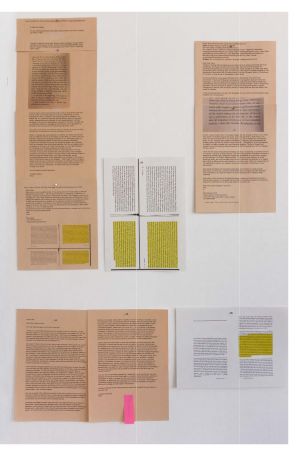Friend / Ships
Une soirée autour de l’idée de l’amitié comme moyen de transmission (dans toute son ambiguïté). Une incarnation de « l’amitié politique » en lisant et en discutant, en réfléchissant et en créant, à travers des rencontres et des liens. Cet événement fait suite au projet Body of Us, la contribution suisse à la London Design Biennale 2018.
Avec, entre autres ami.es : Rebekka Kiesewetter , curatrice de Body of Us , le collectif Continent, éditeurs de la publication éponyme et créateurs du groupe de lecture Reading Friendships, Ethel Baraona Pohl et César Reyes Nájera (dpr-barcelona).
Project description :
“WE ARE TOLD THAT THE -SHIP OF ‘FRIENDSHIP’ is not descended from the homonymous term for a boat, although the truth (êtumos) that is raised by its etymology leaves us less certain of its relationship to seacraft. John Durham Peterson, in his The Marvelous Clouds, ‘trawls’ the etymology of ‘-ship’ and finds that this nautical vehicle is linked to creation, constitution, and condition.”
— Paul Boshears. “What Is This Craft Called ‘Friendship’?“. In Body of Us (2018). Retrieved online http://bodyofus.com/publication/what-is-this-craft-called-friendship)
Friendship is amongst the most fundamental social practices of humankind. We experience and enact friendship in all its ambiguity – the concurrence of sameness and difference – from early childhood on. In as much as our practices of friendship shape and reflect our relation to the world, our relation to the world is reflected in our understanding of relations, connections, attachments – friendship. The space we give is the space we have.
But who are “we” when we talk about “us”? In times of an ever more destructive anthropocentrism, of growing nationalisms, in times of increasing social drift, such false assemblages have lost their innocence. Because what connects “us” might equally separate “us” from one, from the other. There are cracks in any such friendly narrative, cracks through which, as Leonard Cohen reminds, the light gets in.
Facing critical developments in France, in Europe and across the globe, “our” evening at Centre Culturel Suisse centers on questions of the political potentials and worldbuilding implications of friendship as a means to navigate an in between space – where I end and you begin.
How can the fundamental experience called friendship be mobilized as a political force today? What can democracy – or politics as such – be based on, if it accepts concepts of “difference” and “identity” (and thus: “subjectivity”) not as given categorical representations and pre-defined life categories but as movements of becoming and processes of change, matters of ongoing negotiation? Which friendly modes of doing and orienting together can empower new forms of co-existence that might escape the ways in which contemporary technologies and governing forces preemptively capture emotions and control bodies absorbing them into the exclusionary narratives inscribed into representational democracy? What support structures, modes of collective organization, institutional and technological frameworks could be developed to motivate, sustain and support forms of care and action, in solidarity, that would accommodate multiplicity and difference?
Based on previous conversations around the topic in the frame of “Body of Us”, the Swiss contribution to the London Design Biennale 2018, the project’s curator Rebekka Kiesewetter has invited friends to continue the discussion around political friendship: dpr-Barcelona, initiators of the “Parasitic reading room” at the 4th Istanbul Design Biennial 2018, architect Ross Exo Adams, one of the contributors to Body of Us publication, and the continent. experimental publishing collective, initiators of “Reading Friendships Paris“ at Centre Culturel Suisse 2016. At this same venue, three years later, the stage opens for an edition of the “Parasitic Reading Room” and a reprise of “Reading Friendships”, an evening of readings, thinkings, creating and discussion.
You are welcome to bring friends and family, and to contribute vividly with your thoughts and note, reference, media, piece, book or object that comes to mind and comes to friendship. A collective reader will be produced, on stage, during the sessions in Paris on March 20th, 2019.
Can “we” be friends?


